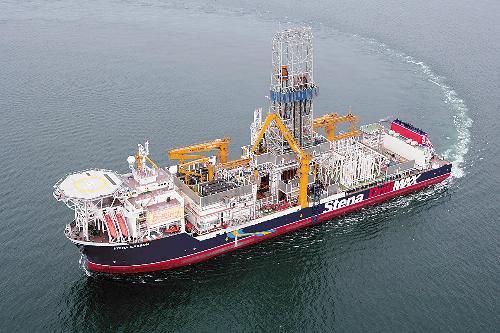Originally posted at my site Bob Higgins
 Oil giant Chevron, in the wake of one of the world’s worst environmental disasters in the Gulf of Mexico is dragging its corporate feet over Canadian requests for increased safety procedures at a deep water well off the coast of Newfoundland. The company’s Lona O-55 exploratory well is about 258 miles northeast of St. John’s, in the Orphan Basin.
Oil giant Chevron, in the wake of one of the world’s worst environmental disasters in the Gulf of Mexico is dragging its corporate feet over Canadian requests for increased safety procedures at a deep water well off the coast of Newfoundland. The company’s Lona O-55 exploratory well is about 258 miles northeast of St. John’s, in the Orphan Basin.
BP’s out of control gusher in the gulf is just over 5000 feet deep while the Chevron well off the Canadian coast is 8,530 feet beneath the surface.
If the pressure of the water column at the site of the BP wellhead is 40,000 lbs per square foot (277 lbs/sq. in.) the pressure of the water column at the site of the Chevron well would be over 68,000 lbs per square foot (473 lbs/sq. in.) The pressures in the reservoir of BPs Gulf well are in the neighborhood of 12,000 lbs/sq. in. after you add up the weight of the water column and the thousands of feet of mud and rock above the reservoir. (water at 8 lbs/cu. ft – rock at 160 lbs/ cu. ft.)
Chevron says that a relief well isn’t necessary; according to their “Atlantic Manager,” Mark McLeod:
“We believe all wells can be drilled incident free. We believe this well will be drilled incident free and we won’t need a relief well.”
Apparently Chevron’s managers and technocrats are suffering under the same the same level of arrogance as their counterparts at BP. I mean really “what could go wrong?”
Canada’s regulations for offshore drilling are more stringent than those called for here in the oil coddling US and require that the planning and equipment necessary to drill a relief well be in place as the main hole is being drilled. This is a costly requirement but one that in a rear view mirror image of the Gulf of Mexico now looks like a bargain.
As depths and pressures increase the farther below the surface and the deeper into the guts of the Earth we drill, the difficulties, dangers and potential for catastrophic outcomes increase at an even greater rate.
Given what we have seen with BP’s disastrous gusher, their failures of management and physical systems, I think that we should require the drilling of a relief well concurrent with the main bore and redundancy in blow out prevention and other safety systems, in all deep offshore wells no matter what the expense, or, stop drilling at such depths and under such conditions.
If these requirements drive up the price at the pump, so be it. We are going to pay the costs of catastrophe anyway by the time BP does their taxes and sticks us up at the refinery and the pump. After all is said and done, applying such realities to the price of oil will make renewable energy sources more competitive and help to hasten the end of our use of fossil fuels.
It seems to me that we should be less concerned with the odds of “an incident” occurring and much more concerned with the potential for catastrophic outcomes resulting from the occurrence of “any incident.”
This ain’t “beanbag” they’re playing in our oceans, this game is for keeps, ask the people who depend on the Gulf for their livelihood; hell, ask a pelican or a dolphin.
I don’t really care what Mark McCleod “believes.” We know from the record so far what BP’s management “believed,” we know that they dragged their feet over safety, over planning and other considerations for undesired outcomes, and we are now paying the costs of their arrogance and will continue to do so for many years.
McLeod also made this statement which I find doubly strange in light of his earlier statement declaring that all wells would be drilled “incident free:”
“I will have to say as you’re drilling a second well you’re exposing people to the risk of drilling each well, so you’re effectively doubling the risk,” MacLeod said.
What should be immediately placed under serious consideration is the establishment of a National Energy Trust modeled along the lines of Norway’s program which would place all Energy under federal control and guidance and begin the formulation of a sane plan for our successful transition beyond the fossil fuel age.
With continued growth of population, the onset of climate change, and increased competition for all resources including food and water it is time for us to protect the commons from corporate usury while we still have something left to protect.
Bob Higgins
Related story:
Chevron: No relief well needed off Newfoundland



Bingo!
The pump price must reflect the true cost of extracting the resource and the inherent risks thereof.
yup!